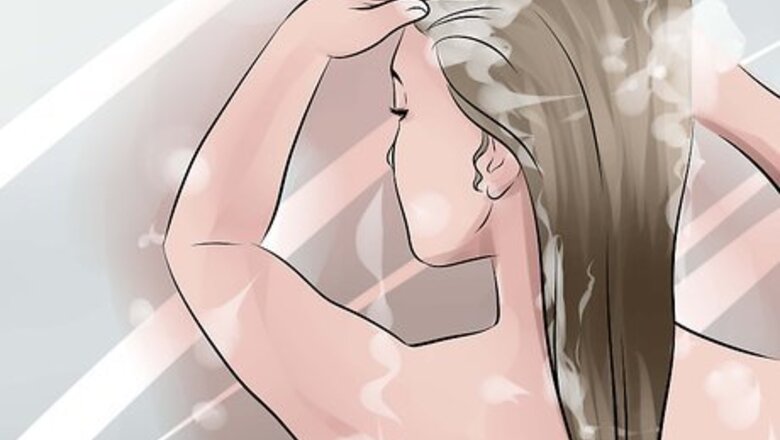
views
X
Trustworthy Source
Mayo Clinic
Educational website from one of the world's leading hospitals
Go to source
While you can’t totally get rid of these bacteria, there are things you can do to reduce them. A little body odor after exercising or being out in the heat is totally normal. However, a chronic bad smell can be a sign of an underlying medical problem, so reach out to your doctor if home remedies aren’t doing the trick.
Good Hygiene Practices
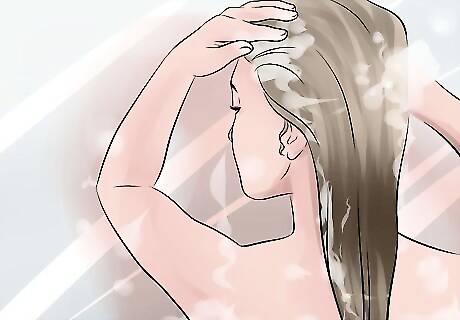
Develop and follow a good daily hygiene routine. A good daily hygiene routine will help minimize the bacteria that cause offensive body odor. Include the following practices in your daily routine: Shower or take a bath daily. Wash your entire body with antibacterial body wash or soap, paying special attention to your underarms, groin, and feet. Shave your armpits. Hair provides additional surface area for bacteria to multiply. By shaving, you will reduce the number of odor-causing bacteria on your body. Dry yourself thoroughly. After you get squeaky clean, dry yourself off with a clean, dry towel. Excess moisture provides a breeding ground for bacteria, so dry your armpits especially well.
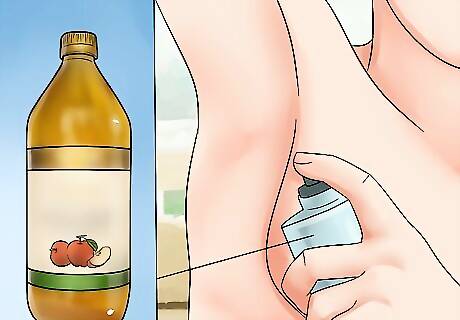
Put a little vinegar on your underarms to reduce bacteria. After showering and before applying deodorant, spritz your underarms with white or apple cider vinegar. Then, wipe them dry with a cloth. This extra step will reduce the number of odor-causing bacteria on your skin and help you smell better. While the vinegar smell may be a little overpowering at first, it should fade after a few minutes. You may need to reapply the vinegar a few times throughout the day if you’re not using any other form of deodorant.
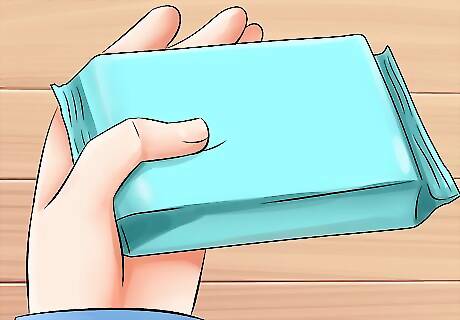
Use baby wipes on the go. In addition to showering daily, keep your armpits and other parts of your body clean and sweat free by using baby wipes or adult body wipes. If you have sensitive skin, choose wipes that are odor-free. If you have hyperhidrosis, a condition that causes excessive sweating, your doctor can prescribe medicated wipes that help reduce sweating and keep B.O. at bay.
Deodorant
Get an aluminum-free deodorant to reduce odors but not sweat. Unfortunately, aluminum-based antiperspirants are the only over-the-counter products on the market that actually reduce sweat. However, there are plenty of deodorants out there that can cut down on unwanted smells without the possible harmful effects of aluminum. Look for products that say “natural deodorant” or “aluminum-free.” Most aluminum-free deodorants contain alcohol, which can help dry your skin and make it less friendly to odor-causing bacteria. Some natural deodorants soak up extra moisture in your armpits, which means they work sort of like a true antiperspirant and help your skin feel cool and dry. Look for moisture-busting ingredients such as aloe and vegetable glycerin.

Buy an antiperspirant to reduce sweating. The aluminum chloride in antiperspirant deodorants reduces sweating, and less sweat means fewer odor-causing bacteria. Make sure that the label reads “antiperspirant” on the deodorant. If the deodorant does not say “antiperspirant,” then it will just add fragrance and reduce bacteria without controlling the sweat. Current studies show that there’s no evidence that aluminum-based antiperspirants cause cancer or Alzheimer’s disease. However, they can cause irritation or allergic reactions in some people. If you’re worried, stick to a deodorant without aluminum chloride. Just keep in mind that it won’t actually reduce sweating. If you struggle with excessive sweating and exceptionally strong body odor, your doctor can prescribe a stronger, medicated deodorant. Keep in mind that these can cause side effects, such as redness, itching, or swelling of the skin.
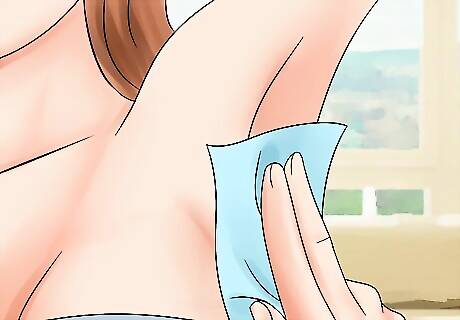
Clean and dry your armpits before using deodorant. It is best to apply deodorant right after you’ve showered. If it has been a few hours since your last shower, use a washcloth and soap or wet wipes to clean your armpits and remove any excess sweat. Then, dry your armpits thoroughly before you apply your deodorant. Applying your deodorant to dry skin will help it stick better and prevent irritation.
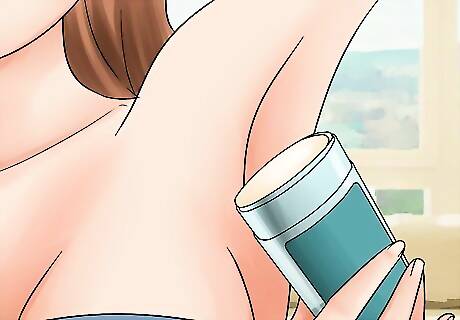
Apply deodorant to your underarms twice daily. Apply your deodorant once in the morning and again in the afternoon or evening. Deodorant wears off as you move and sweat throughout the day, so a second application may be necessary for keeping dry and maintaining a pleasant scent. Don’t forget to clean and dry your armpits before applying a new layer of deodorant! If you only want to apply deodorant once a day, do it before you go to bed. The effects will last longer if you let the deodorant sit on your skin overnight. Carry a small stick of deodorant with you so you can reapply it on the go. If you’re using a deodorant that doesn’t have antiperspirant ingredients, you might need to reapply it more often.
Odors in Clothing

Always wear clean clothing. Put on fresh clothing every morning and wash your clothing after each use. Do not re-wear clothing—especially shirts, undergarments, and socks. Odor-causing bacteria can attach to clothing and multiply. If you get especially sweaty or dirty during the day, change into clean, dry clothes as soon as possible.
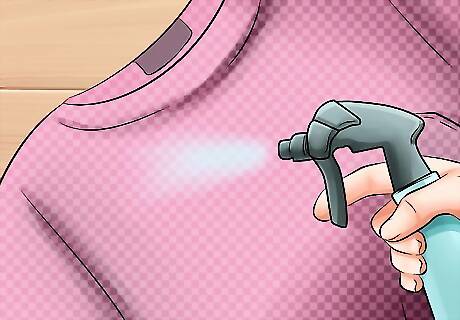
Spritz your dry clean only items with a vinegar and water solution. Since washing your dry clean only garments every time you wear them may not be an option, keep odor causing bacteria at bay with a simple vinegar and water solution. Prepare a 50/50 mixture of vinegar and water in a spray bottle, turn the garment inside out, and spritz a little of the mixture onto the underarm area of your garment. Repeat this process after each wear. Spot test your garment first to make sure the vinegar solution does not cause any discoloration. Look for an inconspicuous spot to test, like under the collar. Don’t use this technique on silk or other materials that might be damaged by moisture.

Keep a set of clean, dry clothes handy. Stash an appropriate spare shirt in your car, gym bag, locker, or office so that you can change out of sweaty clothing on the go. This is especially important if you plan to work out, do a lot of heavy lifting, or spend time in the heat. For instance, if you plan to bike to work or hit the gym after school, you’ll definitely want to have a change of clothes on hand.

Invest in some moisture wicking clothing. Moisture wicking clothing is specially designed to help keep you dry during workouts. Wearing moisture wicking clothing will reduce the amount of sweat and bacteria on your body and your clothing. These clothes are typically made of synthetic materials, such as Spandex. Moisture wicking clothes are ideal for when you’re working out or doing other intense physical activity. Clothes made of natural, breathable materials, such as cotton, wool, or silk, are also great for preventing excess sweat and odor. These kinds of clothes are most appropriate for everyday activities, like working or doing light physical activities. Avoid polyester, which is water-resistant and can trap sweat against your skin. Always wear clothes that are appropriate for the season and environment, since this will keep you comfortable and prevent you from getting too hot and sweaty.
Diet Changes
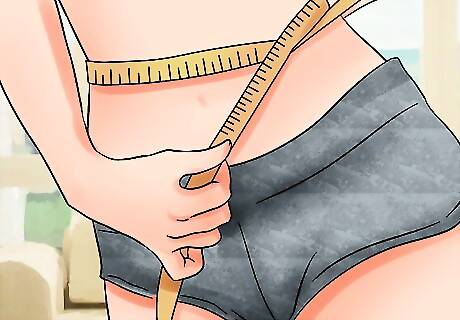
Look for common odor-causing foods in your diet. Some foods can contribute to body odor, so it is worthwhile to think about what you eat and consider reducing or eliminating foods that may be making your situation worse. Think about how often you include the following foods in your diet: Spicy foods. These foods may make you sweat more than usual or cause your body odor to be unusually strong. Meat and fish. Eating a lot of meat can sometimes make your B.O. smell a bit stronger or more unpleasant. Some people also have a rare condition that prevents them from breaking down certain chemicals in seafood, leading to a “fishy” body odor. Eggs. Some people experience unpleasant body odors after eating eggs. They contain a chemical called choline, which can break down into a stinky, fishy smelling compound that comes out in your sweat. Sulfurous foods. Some foods contain higher amounts of sulfur than other foods, which contribute to body odor. Limit your intake of onions, garlic, broccoli, cabbage, asparagus, and cauliflower. Alcohol. When you drink alcoholic beverages, the unpleasant smell of the alcohol may linger on your skin and breath. Caffeine. Drinking too much caffeine could make you sweat more, which can make your B.O. stronger.

Reduce or eliminate problem foods. This process may be difficult, especially if some of your favorite foods and beverages seem to be contributing to your body odor. But remember your reasons for reducing or eliminating these items and go slowly. Try reducing or eliminating one item per week until you have made the necessary adjustments. Talk to your doctor before making any dramatic changes to your diet. For example, if you’re worried that meat is making you stinky, ask your doctor how to get more protein from other sources.

Eat more foods that make you smell nice. Foods that contain probiotics can increase the number of beneficial bacteria in your system, which can in turn help your body odor smell better. Eat probiotic yogurt or try a supplement that contains acidophilus. Other foods that might improve your smell include: Foods rich in compounds called carotenoids, such as pumpkin, carrots, and apricots. Garlic. Yes, garlic can make your B.O. stronger, but some studies show that women prefer the scent of men who eat a diet rich in garlic. Citrus fruits. Pleasant-smelling spices, such as cardamom, cinnamon, rosemary, thyme, and peppermint. Citrus fruits may also help.
Drink plenty of water to reduce sweating. If you plan to work out or do a lot of intense physical activity, bring a water bottle with you and take sips often. Chugging plenty of water helps regulate your body temperature so that you won’t have to sweat as much. Drinking enough water also flushes odor-causing chemicals out of your system faster. You can also get more fluids by eating juicy vegetables and fruits, like cucumbers or watermelon.
Add more fiber to your diet to improve your gut health. Having an unhealthy digestive tract can cause a host of health problems—including unpleasant body odors. Improve your smell and your overall wellbeing by eating a balanced diet with plenty of gut-healthy fiber. Good sources of dietary fiber include: Many fruits, such as apples, berries, and bananas. Vegetables, including green peas, baked potatoes (with the skin on), sweet corn, and raw carrots. While veggies like broccoli and cauliflower are also great sources of fiber, you might want to avoid them if they make you smell worse. Whole grain foods, like barley, whole wheat pasta, quinoa, and bran. Nuts, seeds, beans, and lentils.
Try a probiotic supplement to improve your scent. Probiotics improve your gut health, which can help you smell better. In addition to eating foods rich in good bacteria, such as kefir and yogurt, you might also benefit form a probiotic supplement containing acidophilus. Ask your doctor or pharmacist to recommend a high-quality supplement. Probiotic supplements are generally safe for most people, but talk to your doctor first if you have a weakened immune system. You can also take supplements with chlorophyll, a natural chemical found in plants. Chlorophyll is known to improve the odor of urine and stool. Some people also take it to control external body odor, although there’s less evidence that it works for B.O.



















Comments
0 comment